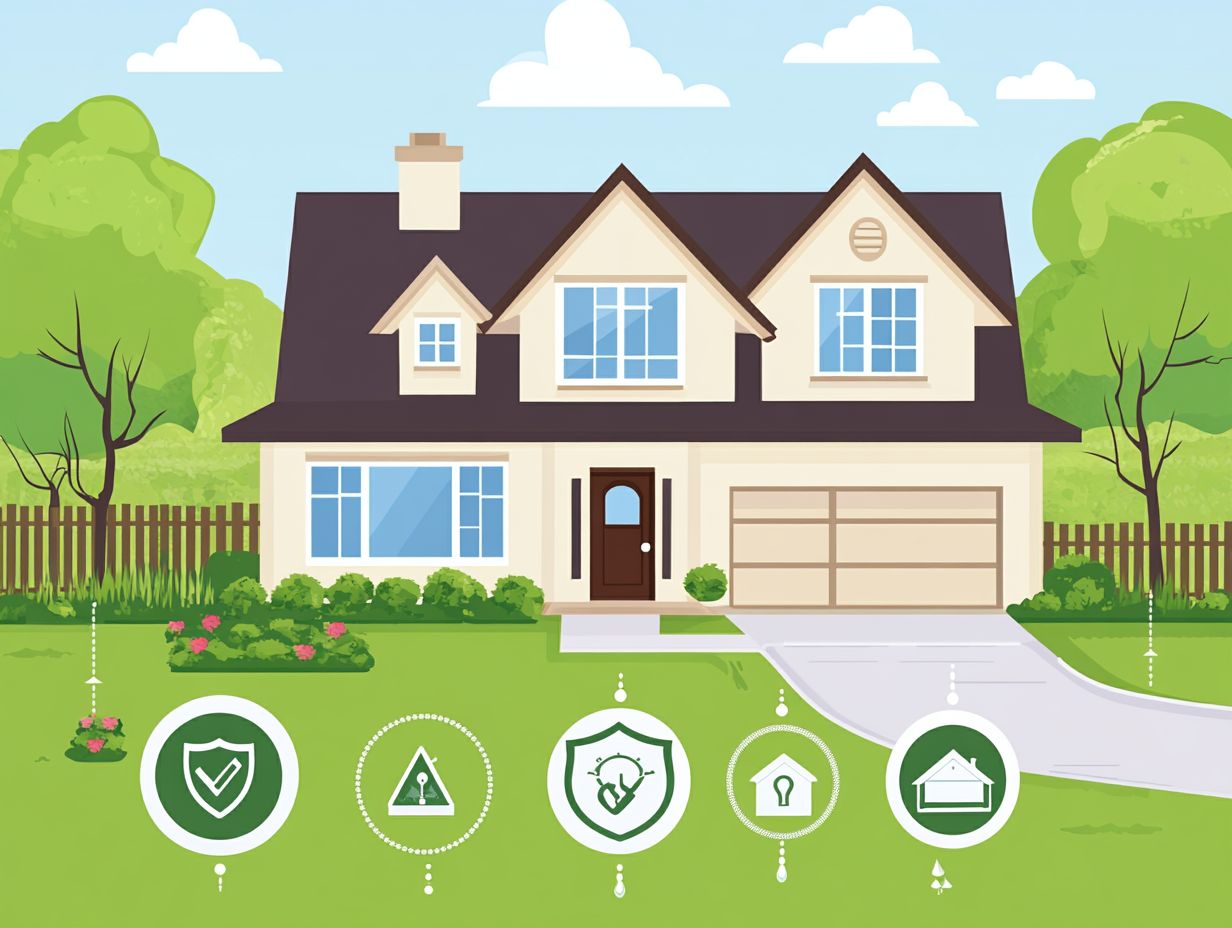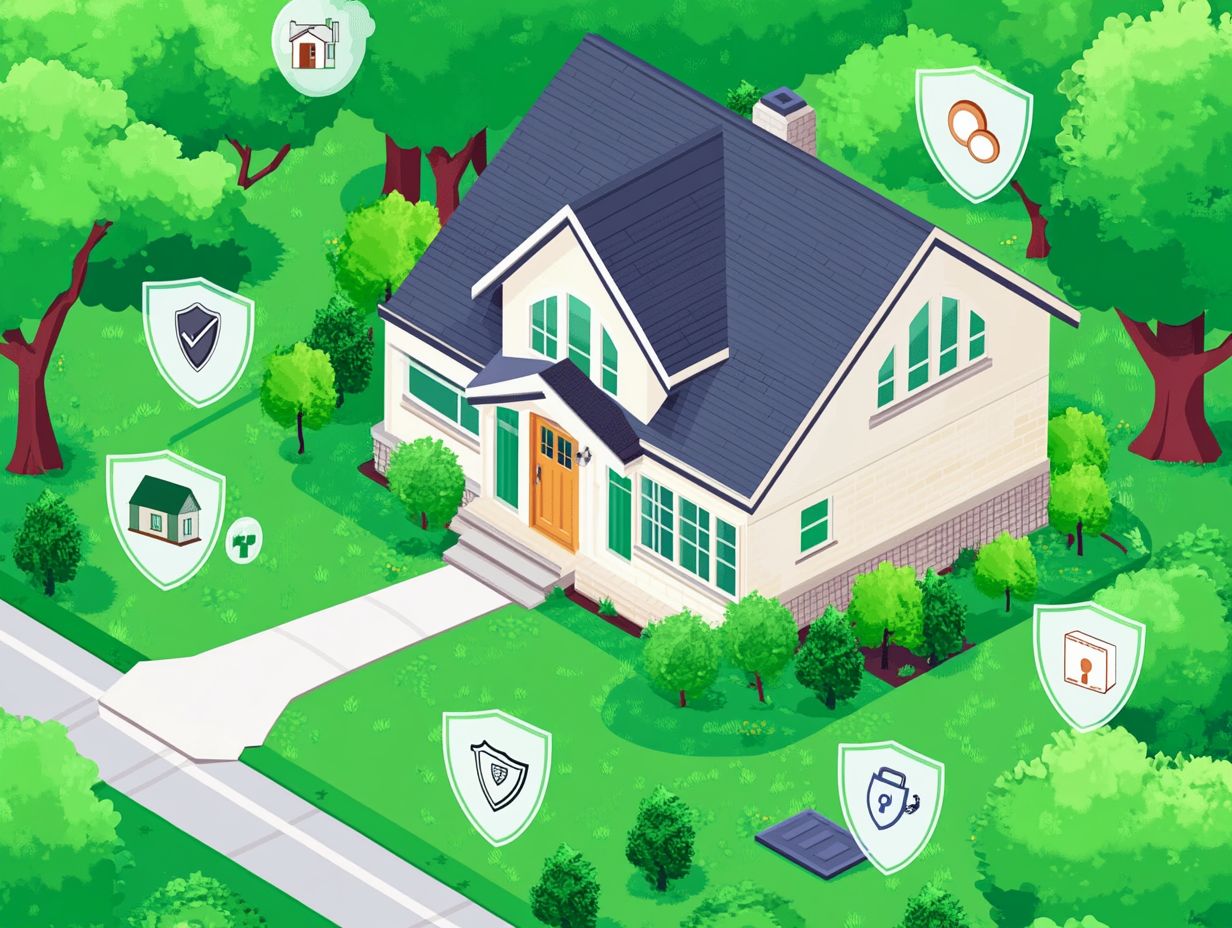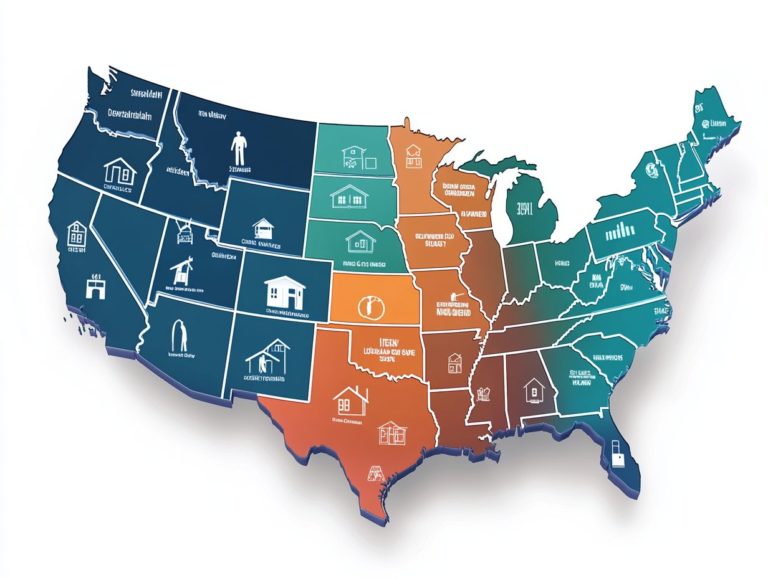Understanding Homeowners Insurance Types
Homeowners insurance serves as a vital shield for safeguarding your investment and personal belongings.
With a plethora of coverage options available ranging from basic to specialized it s easy to feel overwhelmed by the choices.
This guide delves into the various types of homeowners insurance, the factors that influence coverage and premiums, and practical tips for selecting the right policy to meet your needs.
Whether you re a first-time buyer or reassessing your current coverage, this information will empower you to make informed decisions and effectively secure your home.
Contents
- Key Takeaways:
- What is Homeowners Insurance?
- Types of Homeowners Insurance
- Factors Affecting Homeowners Insurance
- Find the Perfect Homeowners Insurance for You!
- Frequently Asked Questions
- What are the different types of homeowners insurance?
- What is the difference between actual cash value and replacement cost?
- What is liability coverage?
- How much homeowners insurance coverage do I need?
- What is excluded from homeowners insurance coverage?
- Can I make changes to my homeowners insurance policy?
Key Takeaways:

Homeowners insurance comes in different types, including basic, comprehensive, and specialized coverage.
Costs vary based on location, property value, and individual circumstances.
To find the best homeowners insurance, evaluate your coverage needs and compare quotes from different providers.
What is Homeowners Insurance?
Homeowners insurance serves as an essential financial safeguard, designed to protect you and your family from potential losses associated with your property.
This policy includes important aspects like dwelling coverage, liability coverage, and additional living expenses should disaster strike.
Grasping the intricacies of homeowners insurance is paramount for securing financial protection and achieving peace of mind, especially when navigating claims or assessing policy limits. Additionally, understanding landlord insurance types can further enhance your coverage options.
With a range of insurance companies offering customized home insurance policies, it s crucial for you to evaluate your specific needs carefully.
Types of Homeowners Insurance
Homeowners insurance presents a diverse array of options, each carefully designed to meet the distinct needs and risks of homeowners. To learn more about the types of home insurance coverage, ensuring that both personal belongings and structures are adequately protected.
Understanding the various types of home insurance policies available is crucial for you as a homeowner, enabling you to choose the ideal coverage tailored to your specific circumstances, including the perils in home insurance types.
From the fundamental HO-1 policy, which offers basic protection, to the more exhaustive HO-5 policy that delivers extensive coverage for personal assets and dwelling risks, it s essential to assess your options to secure peace of mind.
Basic Coverage
Basic coverage in homeowners insurance offers essential protection for your dwelling and personal belongings against specific risks outlined in your policy. This coverage is crucial for you as a homeowner to safeguard your property and ensure that any claims for damages align with the exclusions listed in your policy.
Dwelling coverage primarily addresses the structure of your home, protecting it from damages caused by events such as fire, windstorms, or vandalism. Your personal belongings, including furniture and electronics, also enjoy protection; however, certain high-value items like jewelry or artwork may face limits or exclusions.
Typically, homeowners insurance includes coverage for additional living expenses if your home becomes uninhabitable due to a covered loss, providing you with financial support during such transitions.
To further reduce your costs, be sure to explore various discounts available for features like:
- Modern security systems
- Bundling multiple policies
- Maintaining a good claims history
These strategies can significantly lower your overall premiums, allowing you to keep more of your hard-earned money.
Start exploring your options today and protect your home while saving money!
Comprehensive Coverage

Comprehensive coverage offers expanded protection for your property. It often includes money you receive after depreciation and money that covers the full cost of replacing an item.
This coverage goes beyond basic policies and provides enhanced security against many risks. It ensures you can recover from unexpected events with less financial strain.
You must understand how this coverage affects your insurance premiums and claims process. Knowing the difference between actual cash value and replacement cost is crucial for your decision-making.
Understanding these components will impact your potential claim payout and overall premium costs. Don’t overlook additional coverage options like add-ons for valuable items or protection against natural disasters.
These extra protections enhance your peace of mind. They ensure you are prepared for the uncertainties that life may throw your way.
Specialized Coverage
Specialized coverage is designed for your unique needs as a homeowner. Whether you own a mobile home or need extra protection for valuable possessions, this coverage addresses specific situations.
Many insurance companies offer tailored policies that cater to various risks. Conducting a thorough risk assessment is crucial to identify the necessary specialized coverage.
This evaluation uncovers potential threats you might face. It serves as a valuable guide for choosing the most suitable insurance options.
For example, mobile home insurance can cover vulnerabilities that traditional home insurance might overlook. Specialized personal property coverage ensures that high-value items like artwork or jewelry receive the protection they deserve.
By understanding your unique risks, you can confidently navigate the myriad of options available. This way, you can secure policies that meet your needs and provide peace of mind in an unpredictable world.
Factors Affecting Homeowners Insurance
Several factors influence your homeowners insurance. These primarily revolve around the property’s location, its value, and your personal circumstances.
Insurance companies evaluate the geographical area, assessing risks like natural disasters and crime rates. They also consider how close you are to emergency services when underwriting your policy.
Personal factors, such as your claim history and the upkeep of your home, can greatly affect your insurance premiums. Additionally, the presence of security systems can influence the coverage options available to you.
Location and Property Value
The location of your home and its property value are critical factors that significantly influence your homeowners insurance rates. Insurance providers assess risks based on your geographical area.
This assessment can expose your property to threats like flooding or earthquakes, affecting the risk assessment process. A higher property value usually leads to increased insurance rates due to higher rebuilding costs.
Crime rates in your neighborhood also play a pivotal role in shaping your insurance premiums. Areas with higher criminal activity prompt insurers to perceive a greater risk of theft or vandalism, which drives costs up.
Environmental factors such as being near industrial sites or in disaster-prone regions can lead to specific coverage requirements that further inflate your insurance expenses.
As a result, you may find yourself balancing the desire for comprehensive protection against rising rates. This makes it essential to understand both your coverage options and the inherent risks tied to your location.
Personal Factors

Personal factors like your claims history, behavior as a homeowner, and the presence of security systems wield significant influence over your homeowners insurance premiums.
If you have a track record of frequent claims, you might face higher rates, as insurers see you as a higher risk.
On the other hand, if you’ve invested in effective home security measures, you could qualify for reductions in your insurance premiums.
It’s essential to grasp how your individual circumstances shape your overall coverage and costs.
For example, a homeowner who opts for modern security systems like alarms and surveillance cameras not only safeguards their property but also demonstrates a proactive approach to risk reduction, which could lead to a lower insurance premium.
Regular maintenance, like roof repairs and plumbing checks, reduces risks. This can lead to fewer claims.
By embracing these strategies, you create a safer environment and make yourself more appealing to insurers, ultimately leading to more manageable rates.
Understanding the interplay between your personal risk factors and insurance costs gives you the power to make informed decisions that could positively impact your premiums.
Find the Perfect Homeowners Insurance for You!
Selecting the right homeowners insurance is crucial. Take your time to get it right by understanding what every homeowner should know about insurance, ensuring that your investment is well protected and that you have adequate coverage for both your property and personal belongings.
This process requires careful consideration of your unique circumstances and a thorough understanding of the various insurance providers in the market.
You ll want to compare quotes, evaluate the types of coverage available, and take into account the reputation and financial stability of the homeowners insurance companies.
By doing so, you can make a well-informed decision that safeguards your home and assets effectively.
Assessing Coverage Needs
Assessing your coverage needs is essential to ensure that you have adequate protection against potential risks and losses.
Start by creating a thorough home inventory to document your valuable personal belongings. Familiarize yourself with the maximum amounts your insurance will pay for a claim.
Carefully review the exclusions list within your policy to identify what isn t covered, allowing you to adjust your coverage accordingly.
Taking these proactive measures enhances your financial security and peace of mind.
A well-organized inventory not only streamlines the claims process but also helps you determine the amount of insurance you truly need.
Understanding the policy limits becomes vital during a claim; inadequate coverage can lead to unexpected out-of-pocket expenses.
By interpreting the exclusions list, you can spot potential gaps in your coverage and seek additional protection for vulnerable areas.
With this comprehensive approach, you can safeguard your investment and ensure you re prepared for unforeseen events, ultimately protecting your home and assets more effectively.
Comparing Quotes and Providers
Comparing quotes from various insurance providers is a crucial step in securing the ideal homeowners insurance coverage at a competitive rate.
Gather multiple quotes to assess differences in policy terms, coverage types, and premiums while also considering the reputation and reliability of each insurance company.
Making informed comparisons allows you to choose a policy that meets your coverage needs and aligns with your budget.
As you embark on this process, closely examine the fine print of each policy, paying attention to the specific coverage details that matter most, such as dwelling protection, liability coverage, and additional living expenses.
Weigh the different premiums against the level of coverage provided, keeping in mind that the cheapest option isn t necessarily the best.
Researching customer reviews and ratings can reveal valuable insights about the insurer s claims process and customer service experience, giving you the power to select a provider you can trust for prompt and fair assistance when the need arises.
Frequently Asked Questions

What are the different types of homeowners insurance?
There are four main types of homeowners insurance: HO-1, HO-2, HO-3, and HO-5.
Each type offers different levels of coverage and protection for your home and belongings.
What is the difference between actual cash value and replacement cost?
Actual cash value coverage reimburses you for the current value of your home or belongings, considering depreciation.
In contrast, replacement cost coverage pays for the full cost of repairing or replacing your home or belongings without factoring in depreciation.
What is liability coverage?
Liability coverage protects you if someone is injured on your property and you are found legally responsible.
This coverage can help with medical expenses and legal fees.
How much homeowners insurance coverage do I need?
The coverage amount you need depends on factors like the value of your home, the value of your belongings, and your potential liability risks.
Accurately assessing these factors is key to determining the right amount of coverage for your situation.
What is excluded from homeowners insurance coverage?
Standard homeowners insurance policies typically do not cover damage from floods, earthquakes, or acts of war or terrorism.
Some policies may also exclude certain pets or high-risk items, such as jewelry or art.
Review your policy carefully to understand what is included and what isn’t.
Can I make changes to my homeowners insurance policy?
Yes, you can make changes to your homeowners insurance policy at any time.
This includes increasing or decreasing coverage, adding or removing items, or changing your deductible.
Regularly reviewing your policy helps you stay protected!
Don t wait to protect your home understand your coverage today!






